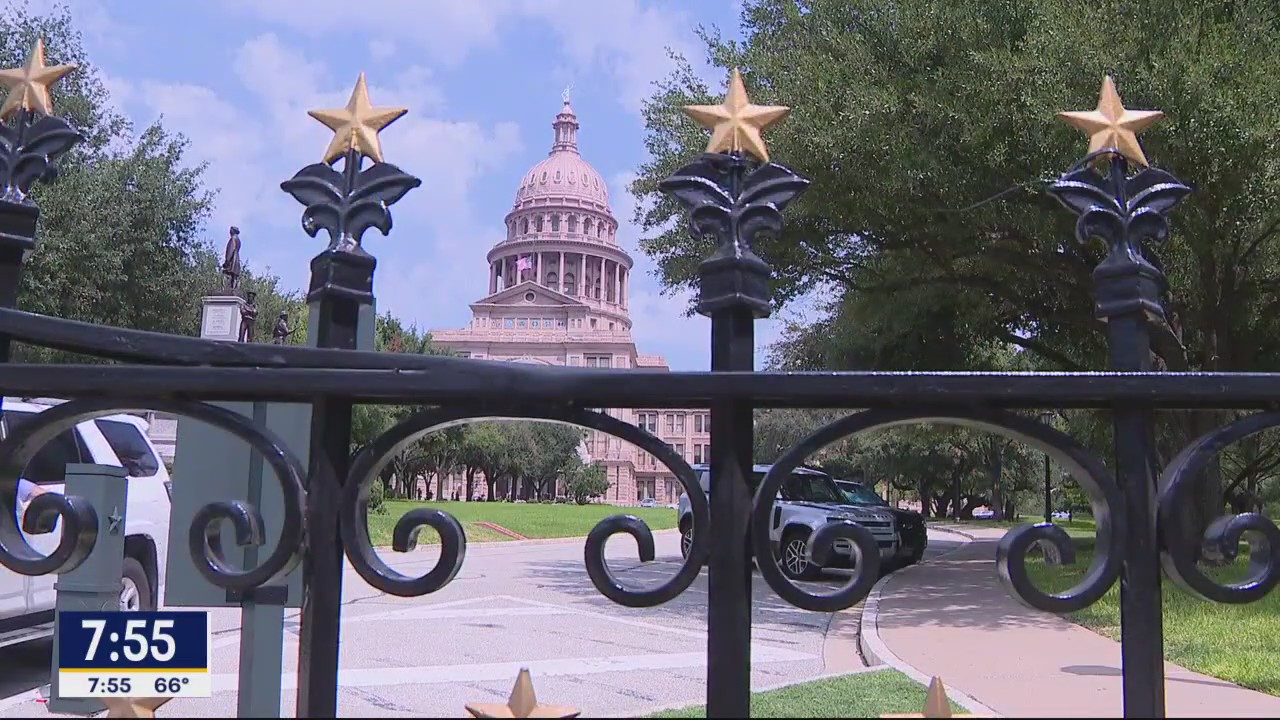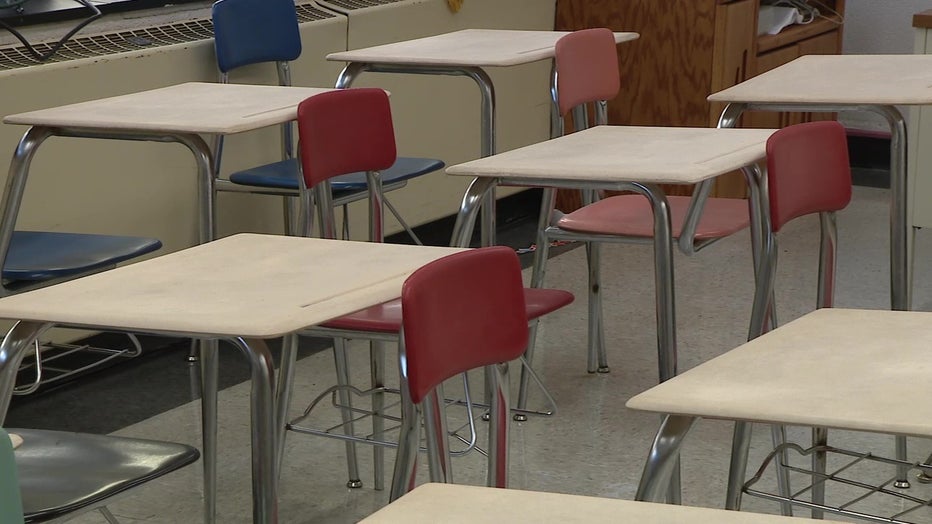Texas Senate passes revamped school funding bill in last-minute bid to implement voucher program

Texas Tribune: Is it a law yet?
There's just one week left in the Texas Legislative session and there is so much yet to be decided, including the state's budget, and property tax relief. Texas Tribune's managing editor Matthew Watkins joined Good Day to talk about the progress at the state capitol.
"Texas Senate passes revamped school funding bill in last-minute bid to implement voucher program" was first published by The Texas Tribune, a nonprofit, nonpartisan media organization that informs Texans — and engages with them — about public policy, politics, government and statewide issues.
Sign up for The Brief, The Texas Tribune’s daily newsletter that keeps readers up to speed on the most essential Texas news.
---
A drastically different version of a school funding bill that’s being used as a last-ditch effort to enact a voucher-like program in Texas was given final approval by the Senate on Tuesday right before midnight. But the House is expected to reject the changes.
The Senate voted 18-13 to advance its version of House Bill 100. Sen. Robert Nichols, R-Jacksonville, joined Democrats in voting against the bill. The bill now heads back to the House, where members will most likely have to negotiate the differences with the Senate. But with only five days left in the Legislative session, it's a race against time for both chambers to reach a compromise.
The changes the Senate made to HB 100 are an attempt to avoid a special session after Gov. Greg Abbott threatened to call for one if he didn’t get a school voucher bill he liked. But that scenario might be difficult to avoid, with some House members furious at the Senate’s revisions and vowing not to let the new version of the bill become law.
The House’s original version of the bill, authored by Rep. Ken King, R-Canadian, only intended to allocate $4.5 billion in new funding for schools to give teachers modest raises and balance their budgets as inflation diminishes the value of the money they get from the state.

The Senate turned it into a more than 100-page omnibus bill that incorporates several provisions of other bills that didn’t make it through the legislative process. Most notably, the Senate version would establish education savings accounts, the voucher-like program that died in a House committee last week. The bill now costs $3.8 billion, with about half a billion going to the voucher program. According to the bill's fiscal note, the voucher-like program could end up costing the state more than $1.5 billion by 2028.
The Senate’s version of HB 100 would give parents who opt out of the public school system up to $8,000 in taxpayer money per student each year through these accounts. The funds could be used to pay for a child’s private schooling and other educational expenses, such as textbooks or tutoring.
Unlike the bill that died in the House committee, the Senate’s version of the voucher-like program would be open to most of Texas’ 5.5 million students — including those already in private schools — with a priority given to students who attend a school that received a C or lower in the state’s accountability rating.
The new version of HB 100 would also increase the basic allotment, the minimum money that schools get per student, by $50. That amount is currently $6,160. The bump is a smaller increase than the $90 that the House initially proposed and would not be adjusted for inflation as the original bill called for.
Mandy Drogin, campaign director of an education initiative for the conservative think tank Texas Public Policy Foundation, said in a statement that the new bill is a win for everyone involved in education.
"Parents are empowered to make the best education options for their children — whether that’s a simplified cross-district transfer process or utilizing an [education savings account], parents have the tools that they need at their fingertips," Drogin said. "At the same time, HB 100 increases teacher pay and improves public school funding, creating a true win-win-win for everyone."
But Rep. Gina Hinojosa, D-Austin, said the upper chamber is playing politics with critical funding — and offering a measly increase to the basic allotment in exchange for vouchers.
Featured
Texas lawmakers OK bill that aims to keep sexually explicit material out of school libraries
Approved by both chambers, the bill is now on its way to the governor. Unless he vetoes it, the bill will become law, which means book vendors will have to assign ratings to books based on depictions or references to sex.
"Fifty dollars is an insult, and they’re trying to make fools out of us," she said. "We won’t pass a full-on voucher."
Hinojosa expects lawmakers won’t reach an agreement on the bill and will have to be back for a special session later this year. For now, a bump to school funding — which many districts desperately hoped for at the beginning of the year — hangs by a thread.
"There is a full-on assault on our public schools by Lt. Gov. Dan Patrick," the leader of the Senate, Hinojosa said. "I’m not just a no; I’m a hell no on that bill."
Earlier this session, Senate lawmakers tried to pass a voucher program open to most Texas children through Senate Bill 8, authored by Creighton. It would’ve established a similar program as the one outlined in HB 100, but the House Committee on Public Education changed the scope of the program by limiting its eligibility to only certain students, like those with disabilities or those who were enrolled at a campus that recently got a failing grade in the state’s accountability rating. The change was an attempt to make education savings accounts more palatable for House members who oppose school vouchers.
That version of the bill never got a vote in the House’s Public Education Committee. Rep. Brad Buckley, R-Killeen, chair of the committee, told The Texas Tribune last week that he questioned whether it was worth bringing the bill up for a vote after Abbott’s threat to veto that version of the bill.
Some Republicans have tried to pass voucher-like programs for decades with no success, historically hitting the same wall: the Texas House. But the bill’s supporters felt they had a shot this time around as they thought some parents’ frustration with health restrictions during the COVID-19 pandemic and the way race and gender identity are taught in schools — something Republicans have seized on in the last couple of years — would give them the swell of support needed to get vouchers over the hump.
In the House, Democrats and rural Republicans have formed a coalition to defeat such programs, fearing they would siphon funds away from public schools, which serve as important job engines and community hubs across the state.
The Senate’s latest play is seen by some as an effort to hold school funding hostage, essentially telling the House that if members want more school funding, the lower chamber has to agree to pass vouchers.
The basic allotment has not changed since 2019, and raising it has been a priority for school officials after the pandemic rattled their finances and inflation diminished the value of the money they get from the state. At the beginning of the legislative session, school districts expressed hope that lawmakers would direct a portion of the state’s historic $32.7 billion surplus to help them.
But trading vouchers for funding is a bargain some schools are not willing to make.
"So you want me to make a deal with the devil? Absolutely not. I’m not making that deal," said Stephanie Elizalde, superintendent of the Dallas Independent School District.
King, the author of HB 100, told the Tribune last year that he would stand against voucher-like programs.
"If I have anything to say about it, it’s dead on arrival," he said. "It’s horrible for rural Texas. It’s horrible for all of Texas."
King did not immediately respond to a request for comment Monday.
Featured
Texas Senate advances strict ‘Don’t Say Gay’ bill
During a late-night vote Monday, the Texas Senate advanced a controversial piece of legislation that would limit classroom lessons, teacher guidance and school programming in Texas public and charter schools.
Other provisions
The new bill would also raise the portion of the state dollars that school districts are required to use to pay for teacher raises from 30% to 50%. The rest can be used for other school expenses, such as maintaining school buildings and buying school supplies. The small increase would likely not help provide substantial pay increases or make a significant impact on school budgets.
HD Chambers, executive director of the Texas School Alliance, an organization of 45 school districts in Texas that educate 41% of the state’s K-12 students, said the Senate is "holding any meaningful improvements to our school finance system hostage until they get ESA vouchers, which ultimately is unfair to Texas students and teachers in our public schools."
"This bill positions private schools as an alternative for families unhappy with their public schools," Chambers said. "However, the reality is that Texas has not made the investments in public education that would enable schools to fully meet the needs of every student."
The revised bill also adds provisions from other bills that either died or have yet to be voted on. It would expand and give more funding to the Teacher Incentive Allotment, a program that promises to pay teachers up to six-figure salaries if they meet certain performance requirements. About 13,000 teachers, or about 4% of the state’s educators, are part of the program.
The latest version of the bill also increases the base amount of money that teachers should make depending on their experience. And it seeks to tackle the state’s teacher shortage by allocating funds to help school districts pay for more teacher residencies, which are programs that place would-be teachers in classrooms with mentors for about a year, teaching them how to do the job before hiring them as full-time educators the following year. According to the National Center for Teacher Residencies, teachers who go through residency programs are more likely to stay in the profession, with 86% still teaching in the same school after three years.
In addition, the bill would allow teachers to send their children to pre-K for free in the districts where they work, if the service is available. Pre-K is not mandated in Texas, but the state helps cover the cost only for students who don’t speak English, are homeless or have parents who are active members of the military. Teachers’ children are not included.
HB 100 would also waive the costs of certain teacher certification exams when people take them for the first time.
The bill would add funding for school districts to rehire retired teachers who, if they can be convinced to return to the profession, are seen as a promising workforce that can help stem the teacher shortage.
Finally, the bill seeks to allocate $300 million in special education funding.
---
Disclosure: Texas Public Policy Foundation and Texas School Alliance have been financial supporters of The Texas Tribune, a nonprofit, nonpartisan news organization that is funded in part by donations from members, foundations and corporate sponsors. Financial supporters play no role in the Tribune's journalism. Find a complete list of them here.
Tickets are on sale now for the 2023 Texas Tribune Festival, happening in downtown Austin on Sept. 21-23. Get your TribFest tickets by May 31 and save big!
This article originally appeared in The Texas Tribune at https://www.texastribune.org/2023/05/22/texas-senate-school-voucher/.
The Texas Tribune is a member-supported, nonpartisan newsroom informing and engaging Texans on state politics and policy. Learn more at texastribune.org.



